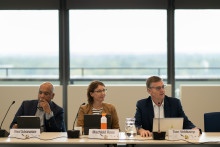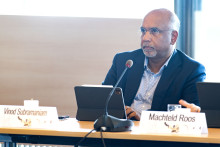The University Council has submitted a proposal, asking the Executive Board to put more emphasis on workload awareness. ‘Workload is an increasing problem for people in faculties and maybe also in service departments,’ said Dirk Meijer. ‘That’s why we say is: make it a focus point of the wellbeing plan. The more students we have to teach, with the same amount of people, increases workload. That is something we should be able to quantify. That’s why we think it’s necessary to make it a priority.’
After some discussion and a formal vote, it was decided that the Board will present a framework of workload assessment criteria. These criteria will be used for reviewing of new policies, as well as policy evaluation once every four years. The goal is have these criteria ready in the September cycle.
To monitor employee workload, it was also decided to build a framework for quantifying tasks and capacity planning. The first step should be making an inventory of all units and tasks at the university, suggested Mirjam Bult, vice-president of the Executive Board. ‘We all know that units are working on capacity planning, but we don’t have a complete overview yet. If we’re going to work out framework for quantifying tasks, we have to make an inventory.’
‘Results of the inventory could be compared to general capacity planning knowledge, organisation requirements, sector requirements and University Council requirements and then we can set up concrete guidelines for capacity planning on the level of units, clusters and individuals,’ continued Bult. ‘We also want to have focus on specific target groups. Because some groups, such as PhD students, are more vulnerable than others.’
Bult stressed that the Board understands the importance wellbeing for staff and students, especially in these times. She announced that the UT will conduct an additional analysis of wellbeing during corona times for both students and staff in the coming weeks. ‘We think this can contribute to wellbeing and ensure that financial means and facilities are made available where necessary.’







